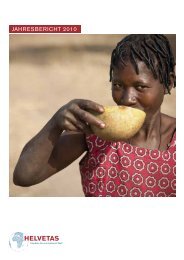Report Feasibility study organic bitter tea Cao Bang - Helvetas
Report Feasibility study organic bitter tea Cao Bang - Helvetas
Report Feasibility study organic bitter tea Cao Bang - Helvetas
You also want an ePaper? Increase the reach of your titles
YUMPU automatically turns print PDFs into web optimized ePapers that Google loves.
7.4. Conclusions<br />
<strong>Feasibility</strong> Study Organic Bitter Tea in <strong>Cao</strong> <strong>Bang</strong>: 2007<br />
The key conclusion from the feasibility <strong>study</strong> is that there is excellent potential for the<br />
production of <strong>organic</strong>ally certified <strong>bitter</strong> <strong>tea</strong> in <strong>Cao</strong> <strong>Bang</strong>.<br />
BTC management and local authorities, through the DOST, appear to be very supportive to<br />
<strong>organic</strong> production. The DOST also indicated that the province could support the<br />
conversion to <strong>organic</strong> provided that it can be demonstrated that <strong>organic</strong> production will<br />
bring benefit to the farmers.<br />
To achieve <strong>organic</strong> certification the <strong>bitter</strong> <strong>tea</strong> and any other crops should be grown to<br />
comply with <strong>organic</strong> standards.<br />
The use of fertilizer and pesticide inputs is relatively minimal and could be substituted with<br />
acceptable <strong>organic</strong> inputs and farming practices.<br />
In many cases the <strong>bitter</strong> <strong>tea</strong> and other crops are grown in such close proximity that the risk<br />
of contamination from the other crop to the <strong>tea</strong> is too great. If it is not possible to convert<br />
the entire farms to <strong>organic</strong>, appropriate measures should be taken (in the form of buffer<br />
zones) to avoid contamination of the <strong>organic</strong> <strong>bitter</strong> <strong>tea</strong> from chemicals used in the other<br />
crops.<br />
The most cost effective way to organize <strong>organic</strong> certification for small holders is through a<br />
group certification programme that requires all the farmers in a group to be farming all<br />
their crops <strong>organic</strong>ally.<br />
It is most practical to set up a unit that will only process <strong>organic</strong> <strong>bitter</strong> <strong>tea</strong>. All the farmers<br />
supplying to this unit must be certified <strong>organic</strong>. Otherwise a parallel production issue will<br />
arise which is difficult to manage in an ICS.<br />
Costs for external certification are relatively high when three certificates are needed.<br />
However, it seems possible to recover the investment through a reasonable increase in the<br />
export price for the <strong>bitter</strong> <strong>tea</strong> (20%). Volumes of <strong>bitter</strong> <strong>tea</strong> required to recover the cost of<br />
certification are between 1000 - 1150 kg based on the number of certificates needed and the<br />
Euro - US dollar exchange rate.<br />
Since the demand for <strong>organic</strong> <strong>bitter</strong> <strong>tea</strong> from the BTC is not very clear, it may be good to<br />
start with a trial on <strong>organic</strong> <strong>bitter</strong> <strong>tea</strong> production. Key aspects of the trial would be to test<br />
the use of <strong>organic</strong> fertilisers, particularly compost and green manure cover crops, and<br />
<strong>organic</strong> pest and disease management. It would also be worthwhile to test whether <strong>bitter</strong> <strong>tea</strong><br />
would grow well under shade.<br />
- 23 -










